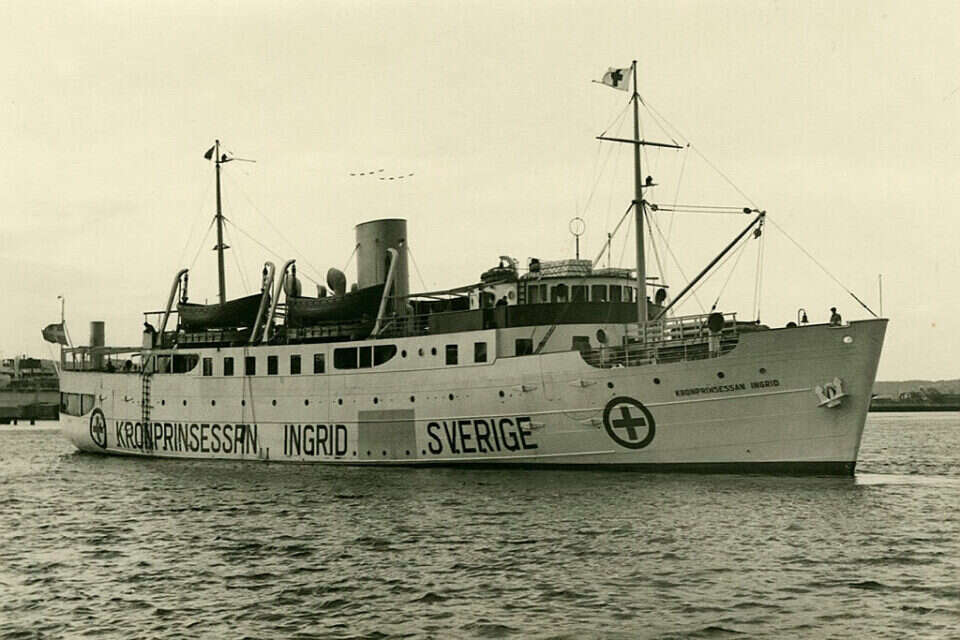Chava Kahana (Bresler) came back to life twice in 1945.
The first time it happened in April, when the British army entered the Bergen-Belsen camp, and the second time - in the summer of the same year, when it was allowed to leave the camp, which had become a displaced persons camp, and sailed to Sweden.
"My cousin and I walked around sick, with dirty clothes full of lice, but we didn't want to go to the hospital (for camp prisoners) because we were afraid they would kill us," says Chava (95), who came to Bergen-Belsen after losing her entire family and surviving the Lodz Ghetto. Auschwitz and forced labor in a factory that produced components for airplanes.
Hava Kahana (left).
"They told us they were going to Sweden", photo: courtesy of Eli Nussbaum
"One day they told us we were going to Sweden. I just remember that we went to a better place, they changed our clothes, put us on a ship and sailed away. It was a different world."
Bresler is one of the thousands of Jews, mainly Jewish women, who were rescued from German soil to Sweden using the "White Boats" - a large-scale operation by the United Nations Refugee Agency UNRWA (not the current UNRWA; DD) and the Swedish government, which has been quite forgotten in collective memory and historiography.
As part of the operation, about 9,300 prisoners from Bergen-Belsen were transported by ambulance trains to the port of Lübeck in northern Germany, underwent tests and initial treatment at the Swedish Red Cross camp, and then continued to various ports in Sweden.
They made the way there in five ships trained for the operation.
Dr. Wasserman-Wroblewski. "For me, these people are heroes", photo: Yehoshua Yosef
How could the operation be forgotten?
Part of the story is the "white buses" operation initiated by Polka Brandot, then the vice chairman of the Swedish Red Cross, who was murdered in Jerusalem in 1948, while serving as a UN mediator in the Israeli-Palestinian conflict.
There were few Jews in the bus operation, but it preceded the "boats" and received more significant publicity.
The Jewish Polish-Swedish researcher, Dr. Roman Wasserman-Wroblewski, who brought up the "boats" from the bottom of oblivion, was also surprised at first by the magnitude of the story. The whiteness," recalls Dr. Wasserman-Woroblawski, "I told her, 'You meant the white buses' - and in response she told me her experiences in the war, including arriving in Sweden on the ship 'Prince Karl' in June 1945."
Wasserman-Wroblewski began to delve into the subject and discovered that hundreds of Jewish survivors, who came to Sweden after the war but their health was already too ruined, died and were buried in the kingdom - without a monument, without proper headstones and basically without anyone bothering to cherish their memory.
But the story of the life was also forgotten and repressed - "also because the Swedish Jewish community preferred to remember Bernadotte's operation, which gave prestige and a touch of royalty", comments Wasserman-Wroblewski.
In any case, after becoming aware of the "white boats" case, Wasserman-Wroblewski began to recreate the operation.
About 9,000 passengers of the "white boats" survived the liberation, arrived at the various ports in Sweden, were quarantined and then transferred to the various hospitals for treatment.
The researcher collected the stories of the survivors scattered among the Swedish hospitals, and cross-referenced them with the transcripts of the interviews conducted upon their arrival by a lecturer in Polish at the University of Lund.
He slowly built a strict list of survivors, whose story was suppressed.
"These young people and children are heroes to me, each one individually and all together," says Wasserman-Wroblewski.
"Then these people immigrated to Eretz Yisrael, built the state, and they were never given the place of heroism they deserve."
Tomorrow (Friday) Dr. Wasserman-Wroblewski will tell the story of the "White Boats" at an event to be held at the Polish Institute in Tel Aviv. By the way, Wasserman-Wroblewski is a story in himself: his father Misha was the only teacher at Janusz Korczak's orphanage who survived the The deportation to Treblinka.
were we wrong
We will fix it!
If you found an error in the article, we would appreciate it if you shared it with us

